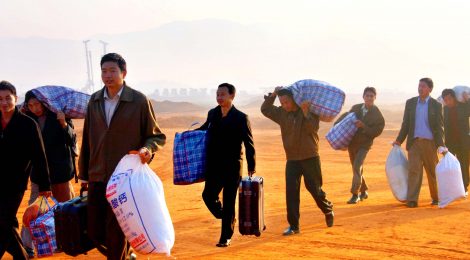
Beijing to relocate nine million people
As part of the 13th Five-Year Plan, Beijing has announced a massive relocation of people from disadvantaged areas. The government, striving to meet its poverty eradication goal by 2020, announced the plan last week, declaring it will involve more than nine million people.
The plan has been approved by the State Council – the chief administrative authority of China – which declared that the relocated citizens will be limited to those who live in impoverished regions with unsustainable conditions. In a report from the People’s Daily it is estimated that the programme will cost roughly the equivalent of € 127 billion.
In the plan, impoverished regions are divided into four groups, including regions with fragile environment and harsh natural conditions, home to 3.1 million individuals. Also included are regions with weak infrastructure, where 3.4 million of the citizens in question currently live.
According to the plan, around 110,000 kilometres of roads and 140,000 kilometres of water pipes will be built for the resettlement, while many new schools and clinics will also be established to meet the migrants’ needs. In addition to fiscal support from the central government, additional channels will also be used to finance relocation, including local government debts and long-term, low-cost loans.
As of last year, there were around 70 million people living below the poverty line in China, many without access to roads, water or power, according to official media reports.
Some sources reported that not all of those to be moved are below the poverty line, earning less than $2 a day. According to these sources some others have been ordered to move as part of the government relocation program.
Families from 1,400 rural counties in 22 provinces will be affected, said Yang Qian, a senior official from the National Development and Reform Commission. It seems that no detail have been given yet about where these families will be resettled or what type of compensation they will get. Yang only said “the people will be fully consulted over where they will go.”
 About 3.2 million chosen for relocation are living in areas affected by severe desertification, soil erosion, water depletion and extreme cold weather. Another 3.4 million were being relocated because they lacked access to basic infrastructure, education and medical care in their areas. Others being moved have had their livelihoods affected by natural disasters or were living in government-sanctioned nature reserves.
About 3.2 million chosen for relocation are living in areas affected by severe desertification, soil erosion, water depletion and extreme cold weather. Another 3.4 million were being relocated because they lacked access to basic infrastructure, education and medical care in their areas. Others being moved have had their livelihoods affected by natural disasters or were living in government-sanctioned nature reserves.
Regional authorities are being required to cough up nearly 360 billion yuan to fund the move, Xinhua said. Authorities will offer job training and livelihood support for resettled families and provide a pension and medical insurance.
In some impoverished regions, poverty has much to do with the natural environment, geographical location and even history, said Professor Tao Ran from the School of Economics at Renmin University in Beijing. “It will be counterproductive if authorities insist on tying them to their (impoverished) land when fighting poverty,” he said.




